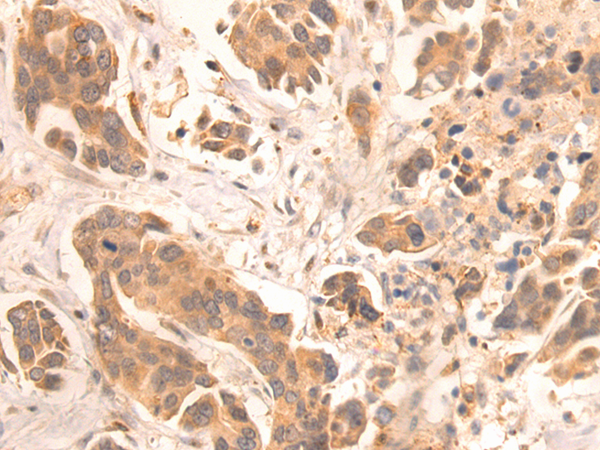
| WB | 咨询技术 | Human,Mouse,Rat |
| IF | 咨询技术 | Human,Mouse,Rat |
| IHC | 1/100-1/300 | Human,Mouse,Rat |
| ICC | 技术咨询 | Human,Mouse,Rat |
| FCM | 咨询技术 | Human,Mouse,Rat |
| Elisa | 1/5000-1/10000 | Human,Mouse,Rat |
| Aliases | ZF47; Zfp47; ZFP306; ZNF306; ZNF309; zfp-47; ZSCAN13; ZSCAN35; dJ874C20.1; dJ874C20.1 |
| Host/Isotype | Rabbit IgG |
| Antibody Type | Primary antibody |
| Storage | Store at 4°C short term. Aliquot and store at -20°C long term. Avoid freeze/thaw cycles. |
| Species Reactivity | Human, Mouse |
| Immunogen | Fusion protein of human ZKSCAN3 |
| Formulation | Purified antibody in PBS with 0.05% sodium azide and 50% glycerol. |
+ +
以下是关于ZKSCAN3抗体的3篇参考文献及其摘要概括:
---
1. **文献名称**:*ZKSCAN3 is a master transcriptional regulator of autophagy*
**作者**:Chaffer, C.L. et al. (2013)
**摘要**:研究揭示ZKSCAN3通过调控自噬相关基因的转录抑制自噬过程。使用ZKSCAN3抗体进行染色质免疫沉淀(ChIP-seq)分析,发现其直接结合自噬基因启动子区域,并在癌症细胞中验证其功能。
2. **文献名称**:*ZKSCAN3 modulates mitochondrial dysfunction and oxidative stress in hepatocellular carcinoma*
**作者**:Yang, S. et al. (2017)
**摘要**:探讨ZKSCAN3在肝癌中线粒体功能障碍中的作用。通过ZKSCAN3抗体进行免疫组化和Western blot实验,证明其表达下调导致活性氧积累并促进肿瘤进展。
3. **文献名称**:*ZKSCAN3 regulates intestinal inflammation by controlling autophagic degradation*
**作者**:Tschurtschenthaler, M. et al. (2014)
**摘要**:研究ZKSCAN3在结肠炎模型中对自噬的调控作用。利用ZKSCAN3抗体敲除小鼠模型,发现其缺失加剧炎症反应,提示其在肠道屏障保护中的关键功能。
---
以上研究均通过ZKSCAN3抗体验证了该蛋白在基因调控、疾病机制中的功能。如需具体期刊或补充信息可进一步检索。
ZKSCAN3 (Zinc Finger with KRAB and SCAN Domains 3) is a transcription factor belonging to the zinc finger protein family, characterized by its KRAB (Krüppel-associated box) and SCAN domains. It is implicated in regulating gene expression by binding to specific DNA sequences, particularly in regions rich in GC nucleotides. ZKSCAN3 has been studied primarily for its role in modulating cellular processes such as proliferation, autophagy, and tumorigenesis. Research suggests it acts as a transcriptional repressor, suppressing genes involved in autophagy and lysosomal biogenesis, thereby influencing cellular homeostasis under stress conditions.
Antibodies targeting ZKSCAN3 are essential tools for investigating its expression, localization, and function. They are widely used in techniques like Western blotting, chromatin immunoprecipitation (ChIP), and immunofluorescence (IF) to study ZKSCAN3's interaction partners, DNA-binding activity, and subcellular distribution. Studies using these antibodies have revealed ZKSCAN3's dual role in cancer—acting as both a potential tumor suppressor and an oncogenic driver, depending on context. For instance, ZKSCAN3 downregulation correlates with enhanced autophagy and inhibited tumor growth in some cancers, while its overexpression promotes metastasis in others. Validated ZKSCAN3 antibodies are critical for resolving these context-dependent mechanisms, though challenges remain in ensuring specificity due to homology with other SCAN-ZNF proteins. Recent work also explores ZKSCAN3's involvement in metabolic regulation and immune response, highlighting its broader biological significance.
×